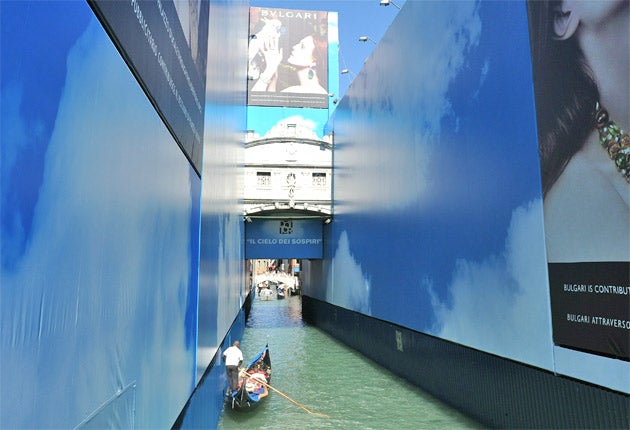Venice's mayor hits back at 'stupidity' of billboard critics

Your support helps us to tell the story
From reproductive rights to climate change to Big Tech, The Independent is on the ground when the story is developing. Whether it's investigating the financials of Elon Musk's pro-Trump PAC or producing our latest documentary, 'The A Word', which shines a light on the American women fighting for reproductive rights, we know how important it is to parse out the facts from the messaging.
At such a critical moment in US history, we need reporters on the ground. Your donation allows us to keep sending journalists to speak to both sides of the story.
The Independent is trusted by Americans across the entire political spectrum. And unlike many other quality news outlets, we choose not to lock Americans out of our reporting and analysis with paywalls. We believe quality journalism should be available to everyone, paid for by those who can afford it.
Your support makes all the difference.The mayor of Venice yesterday condemned the "stupidity and incompetence" of international critics who say he has allowed a rash of billboard advertisements to "grotesquely deface" one of the world's most beautiful cities.
Dismay over the huge, floodlit posters for Coca-Cola, Rolex and Bulgari that obscure palaces up and down the Grand Canal has led prominent figures from the world of art and architecture, including Sir Norman Foster and the head curators of the British Museum and New York's Metropolitan Museum of Art, to demand action. In a joint letter in The Art Newspaper, the group says the Italian government is violating Venice's Unesco ranking as a world heritage site in allowing the hoardings, and calls on the culture minister, Sandro Bondi, and the mayor, Giorgio Orsoni, to ban the advertisements. The minister chose not to respond.
But Mr Orsoni yesterday insisted they were necessary to fund the renovation of the lagoon port's crumbling buildings and went on to mock "the stupidity and incompetence of museum directors who see Minister Bondi and myself as destroyers of the city".
"Perhaps these illustrious personalities think we're savages with rings through our noses," he said. "The salons of London and New York should come to Venice to see how well we're restoring and administrating the city.
"The only way to get around the problem would be to have a magic wand and repair all the buildings in Venice without having to cover them up. These days public money is tight. I would be very happy to accept donations, if they're willing to give them."
Giandomenico Romanelli, the director of the Doge's palace gallery in the main square, said that some of the city's monuments were in such a bad way that falling pieces of mortar posed a risk to public safety. He said the aim was to find a balance between bringing in funds and keeping the numbers and size of the brightly coloured billboards at an acceptable level.
But critics note the city is hardly raking it in from the giant billboards. Advertisers pay just €40,000 (£35,000) a month for a three-year contract to cover part of the Doge's palace overlooking the lagoon and connecting to the Bridge of Sighs, now dubbed the "Bridge of Signs" – a relative bargain in advertising terms.
In their open letter, published under the auspices of the Venice in Peril Fund, the critics note that "only 10 years ago" there were no such adverts, adding: "Today, they are proliferating. They hit you in the eye and ruin your experience of one of the most beautiful creations of humankind. We ask you to imagine the disappointment that the 17.5m visitors to Venice this year will feel. They come to this iconic city with an image of it in their mind's eye and instead they see its famous views grotesquely defaced."
Their appeal has struck a chord in Italy, prompting national newspapers to publish pictures of other landmarks such as the Ponte Vecchio in Florence and Rome's Palazzo Venezia, which have also been covered in advertising.
The problem is most acute in Venice, which – faced with a dwindling population, rising tides, marauding tourists and most recently, the prospect even of plastic gondolas – risks becoming a Disney version of itself.
Join our commenting forum
Join thought-provoking conversations, follow other Independent readers and see their replies
Comments